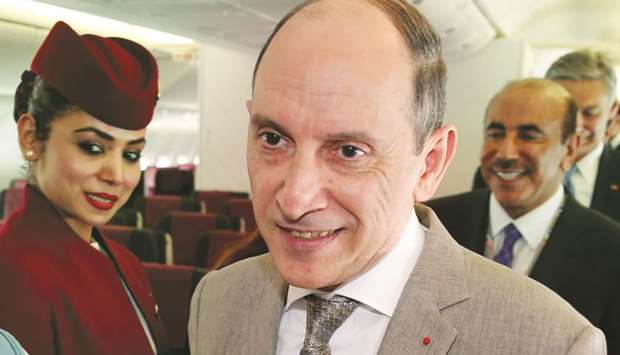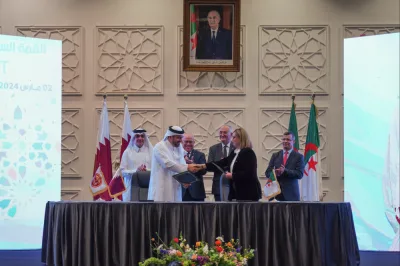The airline is keeping tabs on the business impact of its higher fuel bill after the barriers imposed by Saudi Arabia, the UAE, Bahrain and Egypt shut down 52 routes and forced remaining services into diversions ranging from five minutes to two hours, Qatar Airways chief executive officer Akbar al-Baker said. The restrictions have doubled the flying time on some routes, he said.
Qatar Airways is “making sure that all our business streams are properly documented in order for us in future to go to international tribunals to reflect the pain,” al-Baker said yesterday at the Paris Air Show. The CEO added that he’s unsatisfied with the International Civil Aviation Organisation’s response to what he says is an illegal action unparalleled since the Soviet operation against Berlin during the height of the Cold War, which prompted the US to lead an airlift of supplies to the German city.
“They have been slow,” al-Baker said of the ICAO response. “But those countries have people on the board. We are now waiting two weeks with this situation and nobody has upheld international law.”
The UN agency has been brokering diplomatic discussions that it says are aimed at securing a consensus-based solution to the fallout.
The four Arab states cut diplomatic and transport links with Qatar on June 5. The measures have left Qatar Airways excluded from 18 regional destinations and forced some long-haul flights to detour via Iran and Oman.
Qatar Airways will “march on” with plans to add new destinations and is “successfully mitigating” some of the impact of the network disruptions, al-Baker said. The airline is seeing an increase in bookings and expects the busy holiday of Eid al-Fitr to be “business as usual.”
The carrier has no plans to defer any plane deliveries so long as it can cover direct operating costs and will maintain even the most disrupted routes such as Doha-Sao Paulo, the CEO said, describing the dispute as an “intimidation game.” Excess narrow-body jets from the cancelled regional flights are being redeployed to other destinations, including Iran.
The executive added that the spat won’t affect relations with Boeing and that he’s confident US President Donald Trump will take the right steps in mediating.
Al-Baker said the Trump administration’s ban on carrying laptops into aircraft cabins on US-bound flights from airports including Doha could be eased by an audit of airport security capabilities. He said he has invited the US Department of Homeland Security officials to visit the Qatar Airways hub.
The CEO said he has now firmed up 20 orders for Boeing Co’s 737 Max 8 plane and that the aircraft will go to the airline’s operations starting in the second half of next year. Jets from 40 remaining options could be bought for Italy’s Meridiana, in which Qatar Airways is still keen to buy a stake once it completes final work on the deal.
The carrier is set to begin taking A321neos starting in next year’s the third quarter. Qatar Airways will equip the planes with Leap engines from CFM International, a joint venture of General Electric Co and Safran, after a falling out with Pratt & Whitney over delivery delays.
A possible investment in Royal Air Maroc is on hold pending a restructuring at the Moroccan carrier, though an ambitious plan to establish a carrier in India remains on track, with Qatar having been granted the right to establish a unit there when it is ready to, al-Baker said. Bombardier’s C Series plane, previously rejected for Qatar, could be an option for the Indian division. Page 16



